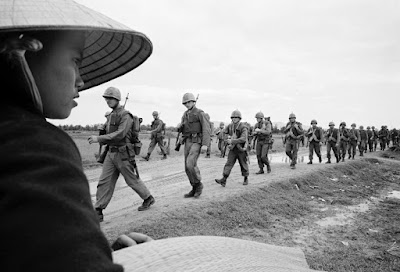Meditations on the Vietnam War: The Ia Drang Valley 1965

"When Robert S. McNamara became Secretary of Defense in 1961, he ushered in sweeping changes aimed at completely reorganizing the Department of the Army and its methods of warfare. He was highly displeased with Army Secretary Elvis J. Stahr, Jr.'s , report on the status of Army aviation plans. McNamara realized the current Army procurement program was hopelessly inadequate in every category of aircraft and considered it dangerously conservative. Furthermore, McNamara felt that the Army failed to exert any strong, unified aviation effort and was plagued by reticence and budgetary restraint which were blocking the adaptation of necessary aircraft and equipment. Most important, he believed that officers with progressive ideas about airmobility were not being heard. "McNamara was convinced that a breakthrough in airmobility was possible with the new Bell helicopter models. He was given a list of officers who also believed Army aviation needed new directio...
